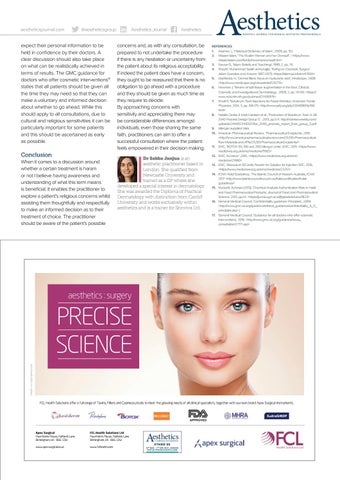aestheticsjournal.com
@aestheticsgroup
expect their personal information to be held in confidence by their doctors. A clear discussion should also take place on what can be realistically achieved in terms of results. The GMC guidance for doctors who offer cosmetic interventions17 states that all patients should be given all the time they may need so that they can make a voluntary and informed decision about whether to go ahead. While this should apply to all consultations, due to cultural and religious sensitivities it can be particularly important for some patients and this should be ascertained as early as possible.
Conclusion
Aesthetics
concerns and, as with any consultation, be prepared to not undertake the procedure if there is any hesitation or uncertainty from the patient about its religious acceptability. If indeed the patient does have a concern, they ought to be reassured that there is no obligation to go ahead with a procedure and they should be given as much time as they require to decide. By approaching concerns with sensitivity and appreciating there may be considerable differences amongst individuals, even those sharing the same faith, practitioners can aim to offer a successful consultation where the patient feels empowered in their decision making. Dr Sabba Janjua is an aesthetic practitioner based in London. She qualified from Newcastle University and trained as a GP where she developed a special interest in dermatology. She was awarded the Diploma of Practical Dermatology with distinction from Cardiff University and works exclusively within aesthetics and is a trainer for Skinviva Ltd.
REFERENCES 1. Adamec L, ‘Historical Dictionary of Islam’, 2009, pp. 102 2. Mission Islam, ‘The Muslim Woman and her Ownself’ , <https://www. missionislam.com/family/mwomanownself.htm> 3. Sarwar G., ‘Islam: Beliefs and Teachings’, 1989, 2, pp. 76 4. Shaykh Muhammad Saalih al-Munajjid, ‘Ruling on Cosmetic Surgery’ ,Islam Question and Answer, 1997-2017) <https://islamqa.info/en/47694> 5. MacReddy N, ‘Dermal fillers: focus on hyaluronic acid’, Medscape, 2008 <http://www.medscape.org/viewarticle/576776> 6. Newman J, ‘Review of soft tissue augmentation in the face’, Clinical, Cosmetic and Investigational Dermatology, 2009, 2, pp. 141-50. <https:// www.ncbi.nlm.nih.gov/pubmed/21436976> 7. Small R, ‘Botulinum Toxin Injections for Facial Wrinkles’, Amercian Family Physician, 2014, 3, pp. 168-175 <http://www.aafp.org/afp/2014/0801/p168. html> 8. Natalie Derise & Kristi Harrison et al., ‘Production of Botulinum Toxin A: BE 3340 Process Design Group 5’ , 2013, pp.5-11. http://nderise.weebly.com/ uploads/2/4/4/1/24410337/be_3340_process_report_final-_group_5.pdf 9. Allergan supplied data 10. American Pharmaceutical Review, ‘Pharmaceutical Excipients’, 2016 <http://www.americanpharmaceuticalreview.com/25335-PharmaceuticalRaw-Materials-and-APIs/25283-Pharmaceutical-Excipients/> 11. EMC, ‘BOTOX 50, 100 and 200 Allergan Units’ ,EMC, 2015 <https://www. medicines.org.uk/emc/medicine/11665> 12. EMC, ‘Azzalure’ ,2016. <https://www.medicines.org.uk/emc/ medicine/21990> 13. EMC, ‘Bocouture 50 Units Powder for Solution for Injection SPC, 2016, <https://www.medicines.org.uk/emc/medicine/23251> 14. ICWA Halal Guidelines, ‘The Islamic Council of Western Australia, ICWA’ 2017 <http://www.islamiccouncilwa.com.au/halal-certification/halalguidelines/> 15. Mursyidi, Achmad (2013), ‘Chemical Analysis Authentication Role in Halal and Food Pharmaceutical Products’, Journal of Food and Pharmaceutical Science, 2013, pp.1-4. <https://jurnal.ugm.ac.id/jfps/article/view/1823> 16. General Medical Council, ‘Confidentiality guidance: Principles’, 2009 <http://www.gmc-uk.org/guidance/ethical_guidance/confidentiality_6_11_ principles.asp> [ 17. General Medical Council, ‘Guidance for all doctors who offer cosmetic interventions’, 2016. <http://www.gmc-uk.org/guidance/news_ consultation/27171.asp>
Design: www.bgd-agency.co.uk
When it comes to a discussion around whether a certain treatment is haram or not I believe having awareness and understanding of what this term means is beneficial. It enables the practitioner to explore a patient’s religious concerns whilst assisting them thoughtfully and respectfully to make an informed decision as to their treatment of choice. The practitioner should be aware of the patient’s possible
Aesthetics Journal
FCL Health Solutions offer a full range of Toxins, Fillers and Cosmeceuticals to meet the growing needs of all clinical specialists, together with our own brand Apex Surgical instruments.
Apex Surgical Hawthorns House, Halfords Lane Birmingham, UK. B66 1DW
FCL Health Solutions Ltd Hawthorns House, Halfords Lane Birmingham, UK. B66 1DW
www.apexsurgical.co.uk
www.fclhealth.com
STAN D 5 5 31 ST MAR - 1 ST APR 201 7, LO N DO N A E S THE TIC S CONFE RE NC E .COM
Reproduced from Aesthetics | Volume 4/Issue 5 - April 2017
